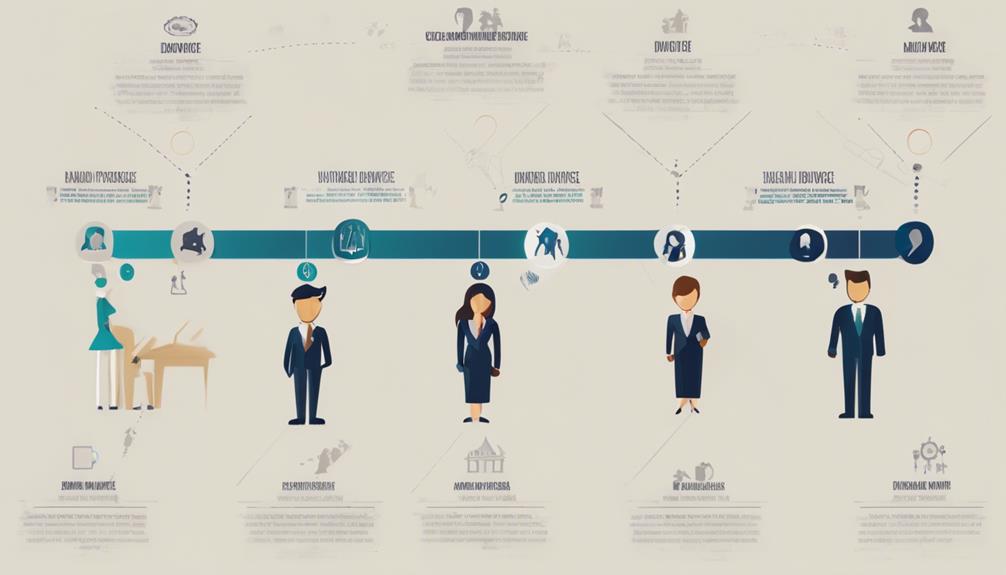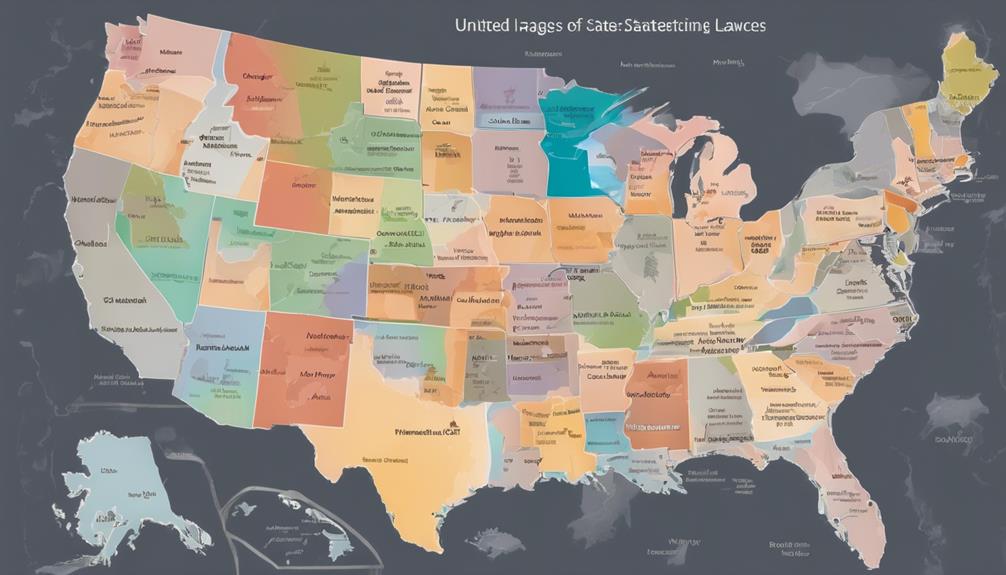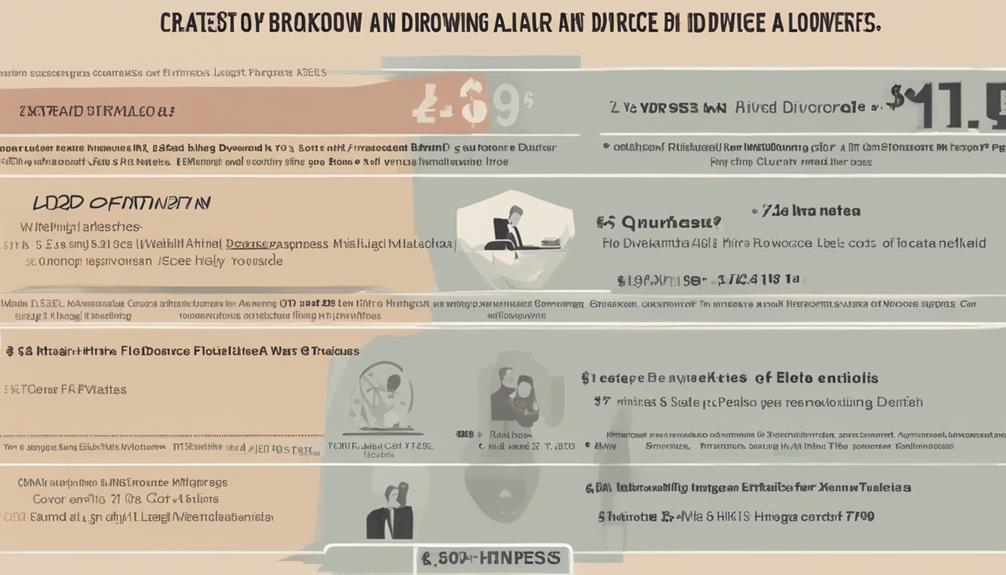Navigating the Divorce Process
3 Steps for Online Divorce Filing in Illinois
Initiate your online divorce in Illinois with three essential steps, ensuring a smooth process and compliance with legal requirements.

To file for divorce online in Illinois, the process involves three key steps. First, confirm eligibility by meeting uncontested terms and residency requirements. Second, utilize Illinois Legal Aid Online for guided interviews and a user-friendly experience. Finally, for child support and maintenance, use the platform's resources for accurate form completion and adherence to legal requirements. Following these steps meticulously is important for a smooth and compliant online divorce filing experience in Illinois. Further insights into these essential steps await for those looking to initiate their online divorce process in the state.
Key Takeaways
- Access Illinois Legal Aid Online for guided interviews.
- Complete the Petition for Dissolution form accurately.
- Ensure compliance with residency requirements.
- Utilize e-filing for efficiency.
- Seek assistance with child support forms if needed.
Eligibility and Required Forms
What're the eligibility requirements and necessary forms for online divorce filing in Illinois?
In Illinois, to file for an online divorce, both parties must agree on uncontested terms, ensuring a smoother and quicker process. The essential form needed for online divorce filing in Illinois is the Petition for Dissolution of Marriage or Civil Union. Residents must meet specific residency requirements to qualify for an online divorce in Illinois. E-filing, which allows the electronic submission of divorce documents, is a common and efficient method used in the state.
Additionally, Illinois Legal Aid Online offers valuable assistance through guided interviews to help individuals complete the necessary forms accurately and efficiently. This resource can be particularly helpful in ensuring that all required documentation, including forms related to child support if applicable, is properly completed and submitted. By meeting the eligibility criteria and completing the necessary forms correctly, individuals can initiate the process of dissolving their marriage online in Illinois.
Utilizing Illinois Legal Aid Online

Utilize Illinois Legal Aid Online for free guided interviews to efficiently complete divorce forms online. This platform offers a user-friendly experience for individuals maneuvering the divorce filing process in Illinois.
By accessing Illinois Legal Aid Online, users can find tailored step-by-step guidance and specific forms required for an uncontested divorce. Whether ensuring Illinois residency requirements are met or seeking ADA accessibility, this resource simplifies the form completion process.
The forms finalized through Illinois Legal Aid Online are verified for use in the divorce proceedings, providing users with confidence in their submissions. This service streamlines the paperwork aspect of divorce, allowing individuals to focus on other essential aspects of their separation.
Take advantage of this online tool to expedite the completion of necessary forms accurately and efficiently.
Assistance With Child Support and Maintenance
Illinois Legal Aid Online offers a guided interview to assist individuals in completing child support and maintenance forms efficiently. This resource simplifies the process by guiding users through the necessary steps to guarantee compliance with legal requirements.
Additionally, Odyssey Guide and File provides a similar service tailored to completing forms related to child support, making the process more accessible and user-friendly.
Here are three key points to take into account when seeking assistance with child support and maintenance:
- Utilize Illinois Legal Aid Online or Odyssey Guide and File for guided assistance in completing child support and maintenance forms accurately.
- Guarantee compliance with legal requirements by using approved forms specifically designed for child support and maintenance agreements.
- Request changes to child support payments by filing a motion to increase or decrease the amount, following the appropriate legal procedures outlined in Illinois for online divorce filing.
Frequently Asked Questions
Can You File for a Divorce Online in Illinois?
Yes, individuals can file for a divorce online in Illinois. Online platforms like Illinois Legal Aid Online and OnlineIllinoisDivorce.com assist with the process. However, appearing in court is still necessary for finalization. Hiring an attorney is recommended for support.
What Documents Are Needed to File for Divorce in Illinois?
To file for divorce in Illinois, one needs the Petition for Dissolution of Marriage or Civil Union. Additional documents like a Marital Settlement Agreement and Financial Affidavit may be required. Ensuring accurate completion is important.
What Is the First Step in Getting a Divorce in Illinois?
Meeting the residency requirement of 90 days before filing is the first step in getting a divorce in Illinois. Ensuring eligibility for a simplified divorce can expedite the process. Legal consultation and document preparation are essential.
What Is the Cheapest Way to File for Divorce in Illinois?
The cheapest way to file for divorce in Illinois involves uncontested proceedings, where couples agree on major issues like asset division and child custody. Avoiding litigation can save time and money, making it a cost-effective option.
Conclusion
To sum up, filing for divorce online in Illinois can be a straightforward process if you follow the necessary steps. Remember the adage, 'Where there's a will, there's a way.'
Eligibility and required forms, utilizing Illinois Legal Aid Online, and seeking assistance with child support and maintenance are key components to a successful online divorce filing. By taking these steps, you can navigate the process efficiently and effectively.
Maya brings a wealth of experience in providing emotional support to individuals facing life’s challenges. Her contributions to How Get Divorce are characterized by empathy, understanding, and a profound sense of authority on matters of emotional well-being. Maya’s work is dedicated to ensuring that our community feels supported and understood, offering tools and advice to cope with the emotional aspects of divorce.
Navigating the Divorce Process
How Long Does It Take to Get a Divorce in New York: A Comprehensive Guide
Yearning to unravel the mystery behind divorce timelines in New York? Dive into this comprehensive guide for surprising insights and essential information.

In navigating the maze of divorce proceedings in New York, one can't help but wonder about the elusive factor that determines the timeline of this significant life event. Understanding the intricacies of the legal system and the unique dynamics of each case sheds light on the complexities that dictate the speed at which a divorce can be finalized.
As we explore the various facets of this process, a clearer picture emerges, revealing essential insights that may surprise even the most seasoned individuals in the realm of family law.
Key Takeaways
- Residency requirements influence divorce eligibility in New York.
- Contested divorces typically take 9 months to a year to finalize.
- Choice of fault or no-fault grounds impacts divorce timeline.
- Utilizing online services and mediation can expedite the divorce process.
Residency Requirements and Filing Procedures
Navigating the intricate process of divorce in New York begins with understanding the residency requirements and filing procedures in place. In New York, one spouse must fulfill the one-year residency requirement to initiate divorce proceedings, regardless of fault or no-fault grounds. Complying with state laws, this residency mandate is fundamental in determining eligibility for divorce.
The one-year residency in New York is a pivotal criterion, setting the stage for the entire divorce process. Without meeting this requirement, individuals may face obstacles when attempting to file for divorce. Understanding and adhering to the residency requirement is crucial for a smooth and efficient divorce process in New York.
Types of Divorce Processes in NY

When considering the types of divorce processes in New York, it's essential to understand that they can be broadly categorized as contested or uncontested.
- Contested Divorce Take: Contested divorces in New York typically take between 9 months to a year to finalize due to disagreements over various aspects such as assets division and child custody.
- Uncontested Divorce Take: On the other hand, uncontested divorces generally move faster than contested ones, often concluding in a shorter timeframe.
- Factors Affecting Divorce Process: The length of time for divorce proceedings in New York can be influenced by factors like the level of cooperation between the parties, the complexity of asset division, and the resolution of child custody arrangements. Understanding these distinctions is crucial for individuals navigating the New York divorce process efficiently.
Factors Impacting Divorce Timeline
Understanding the various factors that impact the timeline of a divorce in New York is essential for individuals going through the process. In New York, the choice of fault or no-fault grounds can significantly influence the length of the divorce proceedings.
Additionally, factors such as legal separation status, involvement of minor children, the number of shared assets, the duration of marriage, and the willingness to resolve amicably all play a critical role in determining how long a divorce may take. Disputes over property division and child custody can also lead to prolonging the divorce case.
Opting for alternative dispute resolution methods like mediation can help expedite the process, along with ensuring all necessary paperwork is in order. Seeking legal advice and collaborating with the spouse can further streamline the proceedings.
Considering these factors can help individuals navigate the waiting period and facilitate a smoother resolution in their divorce in New York.
Court Proceedings and Waiting Periods

Court proceedings in New York encompass a varying timeline, typically culminating in about 3 months for uncontested divorces to reach finalization. When navigating divorce proceedings in New York, it's crucial to understand the nuances of the legal system. Here are key points to consider:
- Court Backlog: The backlog in New York courts can result in waiting periods of 6 months to a year for final divorce judgments, impacting the overall timeline of the process.
- Request for Judicial Intervention (RJI): Filing an RJI triggers court intervention and scheduling of a Preliminary Conference, which sets the stage for the legal procedures to follow, influencing the pace of the divorce proceedings.
- Property Division: Disputes over property division can prolong court proceedings, leading to extended litigation and delays in reaching a final resolution. Cooperation between legal teams is essential to streamline the process and avoid unnecessary setbacks.
Understanding these aspects is crucial for managing expectations and effectively navigating divorce proceedings in New York.
Streamlining the Divorce Process
To expedite the divorce process in New York, considering streamlined options such as uncontested divorce or online services can significantly reduce the time required for resolution. Uncontested divorce, where both parties agree on all terms, can lead to a quicker finalization, sometimes taking as little as 2-3 months. Online divorce services are another efficient route, simplifying paperwork and procedures, ultimately expediting the process.
Ensuring the swift and accurate handling of paperwork and agreements is crucial in speeding up the divorce proceedings. Opting for mediation or collaborative divorce methods can also streamline the resolution timeline by fostering open communication and negotiation between the parties involved.
Frequently Asked Questions
How Long Does It Take for a Divorce to Be Finalized in New York?
It can take varying durations for a divorce to be finalized in New York, influenced by factors like uncontested or contested status, agreement between parties, and court scheduling. These elements significantly impact the timeline.
How Can I Get a Quick Divorce in Ny?
Getting a quick divorce in NY is like a well-orchestrated dance: smooth and efficient. By staying cooperative, preparing thoroughly, and seeking legal aid when needed, spouses can expedite the process, potentially finalizing it in weeks.
What Happens After Divorce Papers Are Filed in New York?
After divorce papers are filed in New York, the respondent must be served within 120 days. They then have 20 days to respond if in-state, or 30 days if out-of-state. Failure to respond leads to an uncontested divorce.
Do You Have to Be Separated for a Year to Get a Divorce in Ny?
We don't need to be separated for a year in New York to get a divorce. The state offers a no-fault option based on an irretrievable breakdown of the marriage, eliminating the mandate for a lengthy separation period.
Conclusion
As we navigate the intricate paths of divorce in New York, we find that time isn't merely a measure of days and months, but a symbol of growth, healing, and transformation.
The process may be complex and challenging, but it also offers opportunities for resolution and closure. By understanding the factors at play and actively participating in the proceedings, we can streamline the journey towards a new chapter in our lives with compassion and clarity.
Allison is the driving force behind our content, ensuring that every piece of information we share is both empowering and insightful. With a keen eye for detail and a deep understanding of the divorce process, Allison curates content that speaks directly to the needs of our audience. Her expertise ensures that How Get Divorce remains a trusted and authoritative source of guidance for those navigating the difficult waters of divorce.
Navigating the Divorce Process
How to Get Your Attorney Fees Paid in a Divorce
In navigating divorce, understanding how to secure payment for attorney fees is crucial, but what happens if you miss a critical step?

Navigating through the intricacies of divorce, making sure you have your legal fees covered is an essential component of the process. For example, in some areas, like Texas, it’s crucial to incorporate a formal plea for the payment of fees in your initial divorce filing.
But what happens if this step is overlooked or not done correctly? Understanding the underlying principles and legal strategies that influence the payment of attorney fees in a divorce can significantly impact the outcome of your case.
Let's explore the nuances of getting your attorney fees paid in a divorce and the strategic approaches that can help secure financial assistance for legal representation.
Key Takeaways
- Request interim attorney fees based on financial need during divorce.
- Judges can order fee payments from community assets or spouse's income.
- Discuss financial situation openly to negotiate fair attorney fee payment.
- Consider alternative payment sources like selling assets or incurring debt.
Legal Options for Attorney Fees
When facing the financial burden of attorney fees in a divorce, understanding the legal options available is crucial for securing fair representation. In a community property state like Texas, spouses may be entitled to have their attorney fees paid from community assets.
Interim attorney fees can also be requested during the divorce proceedings to ensure both parties have access to legal representation. It's essential to seek legal assistance to navigate the complexities of these financial matters.
Judges have the authority to order payment of attorney fees based on the ability to pay from community assets. They carefully assess the reasonableness of the fees requested and may order payment from various sources. Methods to pay one's spouse's attorney fees can include making periodic payments from income, selling nonliquid property, or even incurring debt if necessary.
Ensuring that attorney fees are addressed promptly and fairly is crucial, especially in cases involving child custody where legal representation is vital for protecting one's rights.
Factors Influencing Fee Payment

Considering the financial dynamics at play in a divorce, various factors come into play when determining the payment of attorney fees, with the court weighing the financial standing of both parties as a critical influencer in the decision-making process. In Texas, attorney fees are considered community property until the divorce is finalized. Interim fees can be requested during the ongoing divorce process based on financial need. It's crucial to note that bad faith actions like hiding assets or non-compliance with court orders can lead to one spouse being responsible for paying the other's attorney fees. Additionally, judges may order one spouse to pay the other's fees to ensure equal access to legal representation. Fairness and equal representation are significant considerations for the court when making payment determinations regarding attorney fees in a divorce. Below is a table summarizing the key factors influencing fee payment:
| Factors | Influence on Fee Payment |
|---|---|
| Financial Status | Critical consideration |
| Bad Faith Actions | Responsibility for fees |
| Interim Fees | Based on financial need |
| Equal Representation | Ensuring fairness |
| Court Orders | Compliance importance |
Financial Considerations and Strategies
Understanding the financial implications and implementing effective strategies play a crucial role in navigating the payment of attorney fees during a divorce. It's important for both spouses to consider the financial status of each party when requesting payment of attorney fees.
In the legal realm, judges have the authority to order one spouse to pay the other's attorney fees based on just and right division principles. Temporary fees can be sought through a Motion for Interim Attorney Fees to cover ongoing legal costs. Spouses may need to provide justification for the reasonableness of the fees requested by their attorneys.
Exploring alternative payment sources, such as selling nonliquid assets or incurring debt, can be viable strategies to cover attorney fees during the divorce process. By being mindful of the financial aspects and leveraging available legal options, both parties can work towards a fair resolution in the payment of attorney fees.
State-Specific Laws and Resources

Navigating the intricacies of divorce laws and available resources in your state can significantly impact the outcome of attorney fee payments. In Texas, understanding the state-specific laws related to attorney fees is crucial for a successful divorce process. Here are some key points to consider:
- Attorney fees: In Texas, attorney fees can be requested in the original petition for divorce.
- Financial status: Texas courts take into account the financial status of both parties when determining attorney fee payments.
- Income disparity: Judges may order one spouse to pay the other's attorney fees in cases of significant income disparity.
- Bad behavior: Engaging in bad behavior during the divorce process, like hiding assets or not complying with court orders, can result in paying the other party's attorney fees.
- Interim fees: Interim attorney fees can be requested to ensure legal representation for both parties throughout the divorce process.
Understanding these nuances can help you navigate the legal landscape effectively and secure fair attorney fee payments in Texas courts.
Negotiating Attorney Fees Efficiently
Let's smoothly shift our focus to efficiently negotiating attorney fees by strategizing smartly and communicating effectively during the divorce process. When dealing with attorney fees, it's crucial to discuss your financial situation openly with your legal representative to assess if your spouse can be held accountable for covering these costs. Providing evidence of your spouse's higher income or financial advantage can strengthen your case for them to pay your attorney fees. Negotiation plays a key role here; aim to reach a mutual agreement with your spouse or their attorney on sharing or covering the attorney fees to prevent court intervention. Be ready to justify the reasonableness of the fees and expenses incurred during the process. If your spouse is unwilling or unable to cover these costs, explore alternative payment arrangements like selling assets or securing a loan. Efficient negotiation is the cornerstone of getting your attorney fees paid in a divorce.
| Efficient Negotiation Tips | |
|---|---|
| Discuss Financial Situation | Provide Evidence of Spouse's Higher Income |
| Negotiate with Spouse | Justify Attorney Fees & Expenses |
| Consider Alternative Payments | Avoid Court Intervention |
Frequently Asked Questions
Who Loses the Most in a Divorce?
In a divorce, the spouse with higher income or more assets may bear more legal fees. Financial disparities impact who shoulders expenses. Court decisions consider income and assets. Fair representation access involves financial need and conduct influences fees responsibility.
Can My Spouse Make Me Pay Her Divorce Attorney Fees in Texas?
We understand the concern about spouses making each other pay attorney fees in Texas. Financial circumstances, assets, and behavior influence this decision. It's crucial to address attorney fees in the original petition for the court to consider them.
Who Pays for a Divorce in Texas?
We share insights on who pays for a divorce in Texas based on financial circumstances and court orders. Factors like income and assets influence fee payments. Community property laws affect division. Seeking temporary fees through a Motion for Interim Attorney Fees can assist.
How to Get a Free Divorce in Texas?
Getting a free divorce in Texas isn't possible, but cost-reducing options exist. Seek assistance from county legal clinics, pro bono services, or apply for fee waivers. With diligence, affordability in divorce proceedings can be achieved.
Conclusion
In the journey of divorce, remember: 'You get what you pay for.' By seeking legal guidance and understanding your options for attorney fee payment, you can navigate this challenging time with confidence and support.
Don't let financial concerns hold you back from obtaining the representation you deserve. Stay informed, stay proactive, and remember that your well-being is worth the investment in quality legal assistance.
Allison is the driving force behind our content, ensuring that every piece of information we share is both empowering and insightful. With a keen eye for detail and a deep understanding of the divorce process, Allison curates content that speaks directly to the needs of our audience. Her expertise ensures that How Get Divorce remains a trusted and authoritative source of guidance for those navigating the difficult waters of divorce.
Navigating the Divorce Process
How Much Does It Cost to Get a Divorce in Florida: a Complete Guide
Open the door to understanding the intricate costs of divorce in Florida for a couple with assets and complex custody, revealing surprising insights.

Imagine a scenario in which a couple, who owns considerable assets and has a complicated arrangement for child custody, opts to file for divorce in Florida. The financial impact of this situation can be significant, leading to inquiries regarding the overall costs and the strategies for managing them efficiently.
Understanding the breakdown of costs, from legal fees to court expenses, is crucial for anyone navigating the divorce process in Florida. By exploring the nuances of divorce costs in the state and the various factors that influence them, individuals can make informed decisions about their next steps in this challenging process.
Key Takeaways
- Divorce costs in Florida range from $5,000 to $30,000, influenced by various factors.
- Uncontested divorces cost under $500 for DIY paperwork or up to $5,000 with lawyer assistance.
- Contested divorces in Florida can range from thousands to tens of thousands of dollars.
- Hiring a divorce lawyer in Florida averages $300 per hour, impacting overall divorce expenses.
Average Cost of Divorce in Florida
When considering the average cost of divorce in Florida, it's essential to understand the varying factors that can significantly impact the overall expenses involved.
In Florida, the average cost of divorce ranges between $5,000 and $30,000. This range is influenced by various factors such as marital property, debts, presence of children under 18, alimony requests, attorney fees, and the duration of legal proceedings.
The financial implications of divorce can be substantial, especially when legal representation is needed. On average, lawyers in Florida charge around $300 per hour, which can quickly add up throughout the divorce process.
Additionally, the willingness of both spouses to compromise and the decision to hire experts for evaluations can also affect the total cost of divorce.
Understanding these financial considerations and planning accordingly can help spouses navigate the complexities of divorce in Florida more effectively.
Uncontested Divorce Costs in Florida

How do uncontested divorce costs in Florida compare to traditional legal proceedings? In Florida, uncontested divorce costs can vary significantly depending on the approach taken. Here is a breakdown of the costs associated with uncontested divorces in Florida:
| Aspect | Cost Range | Details |
|---|---|---|
| DIY Paperwork | Under $500 | Can be a cost-effective option for couples in agreement. |
| Lawyer Assistance | $3,000-$5,000 | Hiring a lawyer can provide legal guidance but at a higher cost. |
| Filing Fees | $408-$409 | Required fees for filing the divorce paperwork with the court. |
| Online Services | Under $650 | Online services offer a middle ground in terms of cost and assistance. |
Factors such as mutual agreement between spouses and minimal court involvement contribute to the lower costs of uncontested divorces in Florida. Additionally, individuals who cannot afford traditional legal fees may explore options like the Application for Determination of Indigent Status to help reduce costs.
Contested Divorce Expenses in Florida
Contested divorce expenses in Florida can vary significantly based on the complexity of the case, ranging from several thousand dollars to tens of thousands. When navigating a contested divorce in Florida, individuals may encounter various costs that contribute to the overall financial implications of the legal process. Some key factors influencing the contested divorce cost include:
- Expert Witnesses: In cases requiring specialized knowledge, such as child custody evaluations or financial assessments, the involvement of expert witnesses can escalate expenses.
- Property Division: Evaluating and dividing assets in a contested divorce often involves hiring appraisers to determine the value of properties, businesses, or other shared assets.
- Court Filing Fees: Alongside attorney fees, court filing fees and document serving costs are essential components that impact the total expenses of a contested divorce in Florida.
Understanding these financial issues is crucial for individuals going through a contested divorce, as it helps in anticipating and managing the costs associated with the legal proceedings.
Cost of Divorce Lawyer in Florida

Divorce lawyer fees in Florida typically range from an average hourly rate of $300, with retainer fees falling between $2,000 and $5,000. Attorney fees in the state can vary between $260 and $330 per hour, depending on various factors such as case complexity, assets involved, and whether there are children in the picture.
It's essential to consider these aspects when budgeting for legal representation during a divorce. Additionally, Florida law mandates transparency in the types of retainers lawyers use when hired for divorce cases. This transparency ensures that clients understand how their money is being allocated throughout the legal process, offering a level of reassurance during what can be a challenging time.
When navigating the court system, filing paperwork, and advocating for your rights, having a knowledgeable and compassionate attorney by your side can make a significant difference in the outcome of your case.
Factors Affecting Florida Divorce Costs
Considering the multiple facets involved in divorce proceedings, understanding the factors that influence the costs in Florida is crucial for individuals embarking on this legal journey. When it comes to Florida divorce costs, several key elements play a significant role:
- Child Custody and Support: Disputes regarding child custody, visitation rights, and child support can escalate legal fees due to the complexity and emotional nature of these issues.
- Alimony: Claims for alimony can substantially impact the overall expenses of a divorce in Florida, especially if there are disagreements over the amount and duration of support.
- Property Division: Complex property and debt issues often lead to higher divorce costs in Florida, as the equitable distribution of assets requires meticulous evaluation and negotiation.
These factors, along with the need for expert witnesses, hourly rates charged by attorneys, and court costs, all contribute to the financial matters that individuals face when navigating a divorce in Florida. Understanding these influences can help individuals prepare for the potential costs associated with their divorce proceedings.
Frequently Asked Questions
How Much Does It Cost to Get a Divorce in Florida if Both Parties Agree?
If both parties agree, a divorce in Florida can cost less, with DIY paperwork under $500 and online help under $650. Legal assistance typically ranges from $3,000 to $5,000, while filing fees are around $408 to $409.
What Is the Cheapest Way to Get a Divorce in Florida?
Getting a divorce in Florida on a budget? Opting for an uncontested divorce is your best bet. With costs under $500 for DIY paperwork or around $650 with online assistance, it's a cost-effective solution for separations.
How Much Is the Filing Fee for Divorce in Florida?
The filing fee for divorce in Florida ranges from $408 to $409. It's a mandatory cost for initiating the process in Florida courts, covering paperwork processing. Budgeting for this fee is crucial to avoid delays in proceedings.
Can My Spouse Make Me Pay Her Divorce Attorney Fees in Florida?
We understand the concern about spousal payment for attorney fees in Florida. Courts may order one spouse to cover the other's fees based on need and ability to pay. Consulting an attorney for personalized guidance is crucial.
Conclusion
In conclusion, navigating the costly waters of divorce in Florida can be a challenging journey. Despite our best efforts to keep expenses low, the irony is that the emotional and financial toll can often exceed our expectations.
Remember to tread carefully, seek guidance when needed, and prioritize finding a resolution that's both fair and affordable. The price of divorce may be steep, but the cost of peace of mind is priceless.
Allison is the driving force behind our content, ensuring that every piece of information we share is both empowering and insightful. With a keen eye for detail and a deep understanding of the divorce process, Allison curates content that speaks directly to the needs of our audience. Her expertise ensures that How Get Divorce remains a trusted and authoritative source of guidance for those navigating the difficult waters of divorce.
-

 Life After Divorce2 months ago
Life After Divorce2 months agoTD Jakes: Life After Divorce – A Journey of Healing
-

 Navigating the Divorce Process2 months ago
Navigating the Divorce Process2 months agoNavigating the Complexity: Divorce Document Preparation Services Explained
-

 Financial Aspects2 months ago
Financial Aspects2 months agoFinancial Advisor's Guide to Navigating Divorce Finances
-

 Supporting Children Through Divorce2 months ago
Supporting Children Through Divorce2 months agoPositive Effects of Divorce on Children: A Guide to Understanding
-

 Navigating the Divorce Process2 months ago
Navigating the Divorce Process2 months agoDivorce Lawyers New Orleans: Your Ultimate Guide to Legal Separation and Family Law
-

 Navigating the Divorce Process2 months ago
Navigating the Divorce Process2 months agoNavigating Divorce with a Muslim Divorce Lawyer
-

 Navigating the Divorce Process2 months ago
Navigating the Divorce Process2 months agoUnderstanding Dominican Republic Divorce Law
-

 Directory2 months ago
Directory2 months agoCompassionate Vista Divorce Attorney | Family Law Help










































